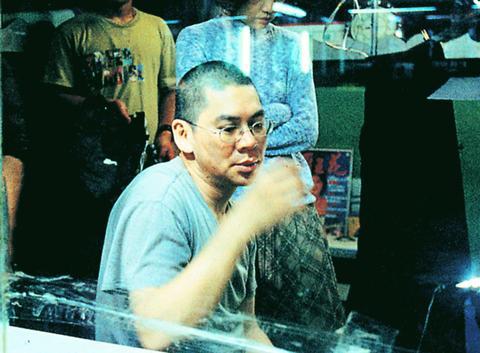Tsai Ming-liang (
Prior to the film's departure for Venice, Homegreen Films, Tsai's own production company, has decided to open a one-week screening in Taipei from today until next Thursday, with screening each day at 7pm at Galaxy Cinema. The film will be officially released in Taiwan at the end of the year.
Goodbye, Dragon Inn makes use of many of Tsai's favorite actors such as Lee Kang-sheng (

PHOTO COURTESY OF HOMEGREEN FILMS
The story of Goodbye, Dragon Inn take place in an old movie theater, a few hours before it is destined to close for good. On this very last day the theater plays a martial arts classic, King Hu's (
Two old men appear at the theater, shocking the Japanese man, for they are Miao Tien and Shih Chun (
Tsai, with his dark sense of humor, pays tribute to the old movie theaters that were part of his childhood days. "When I heard that the Fuho Theater [in Taipei] was to close, I had an impulse to shoot a film about it. Now I look back, it was actually the theater calling to me, saying `come and film me!'" Tsai said. The theater makes an appearance in Tsai's What Time is It There?
London-based film critic and scholar Tony Ryans describes the film as "what may be Tsai's most brilliant metaphor yet." "A lament for the death of feelings framed as a valediction to an entire era of Chinese cinema and an obituary to film-going in general.
Goodbye, Dragon Inn will be Tsai's second entry in the Venice Film Festival. The last time Tsai joined the event was with his second film Vive L'Amour (

In recent weeks the Trump Administration has been demanding that Taiwan transfer half of its chip manufacturing to the US. In an interview with NewsNation, US Secretary of Commerce Howard Lutnick said that the US would need 50 percent of domestic chip production to protect Taiwan. He stated, discussing Taiwan’s chip production: “My argument to them was, well, if you have 95 percent, how am I gonna get it to protect you? You’re going to put it on a plane? You’re going to put it on a boat?” The stench of the Trump Administration’s mafia-style notions of “protection” was strong

Every now and then, it’s nice to just point somewhere on a map and head out with no plan. In Taiwan, where convenience reigns, food options are plentiful and people are generally friendly and helpful, this type of trip is that much easier to pull off. One day last November, a spur-of-the-moment day hike in the hills of Chiayi County turned into a surprisingly memorable experience that impressed on me once again how fortunate we all are to call this island home. The scenery I walked through that day — a mix of forest and farms reaching up into the clouds

With one week left until election day, the drama is high in the race for the Chinese Nationalist Party (KMT) chair. The race is still potentially wide open between the three frontrunners. The most accurate poll is done by Apollo Survey & Research Co (艾普羅民調公司), which was conducted a week and a half ago with two-thirds of the respondents party members, who are the only ones eligible to vote. For details on the candidates, check the Oct. 4 edition of this column, “A look at the KMT chair candidates” on page 12. The popular frontrunner was 56-year-old Cheng Li-wun (鄭麗文)

Oct. 13 to Oct. 19 When ordered to resign from her teaching position in June 1928 due to her husband’s anti-colonial activities, Lin Shih-hao (林氏好) refused to back down. The next day, she still showed up at Tainan Second Preschool, where she was warned that she would be fired if she didn’t comply. Lin continued to ignore the orders and was eventually let go without severance — even losing her pay for that month. Rather than despairing, she found a non-government job and even joined her husband Lu Ping-ting’s (盧丙丁) non-violent resistance and labor rights movements. When the government’s 1931 crackdown